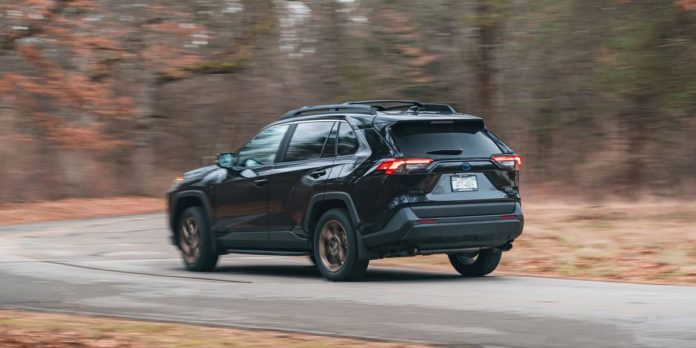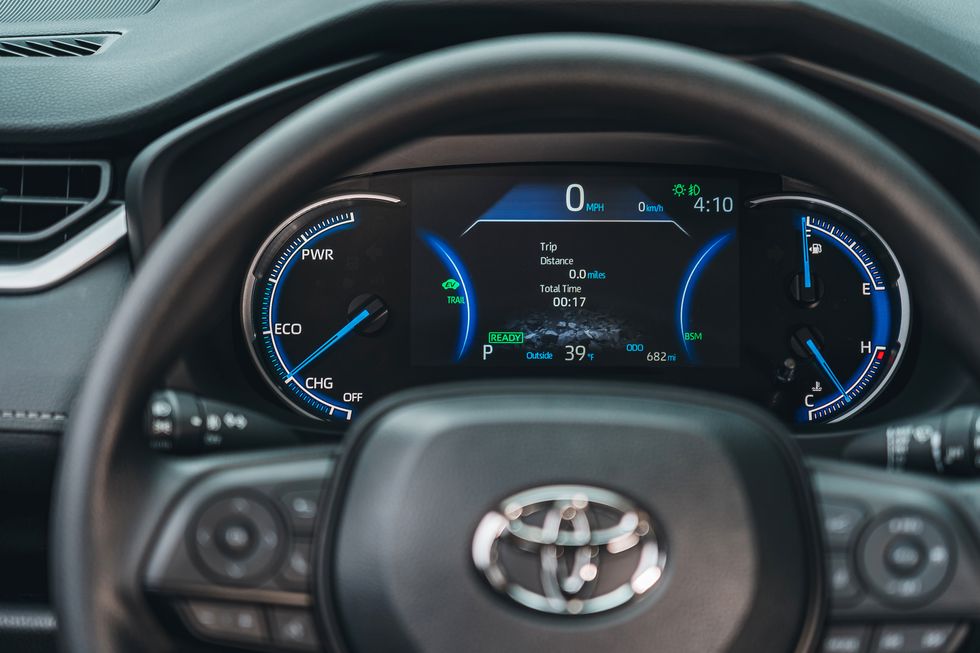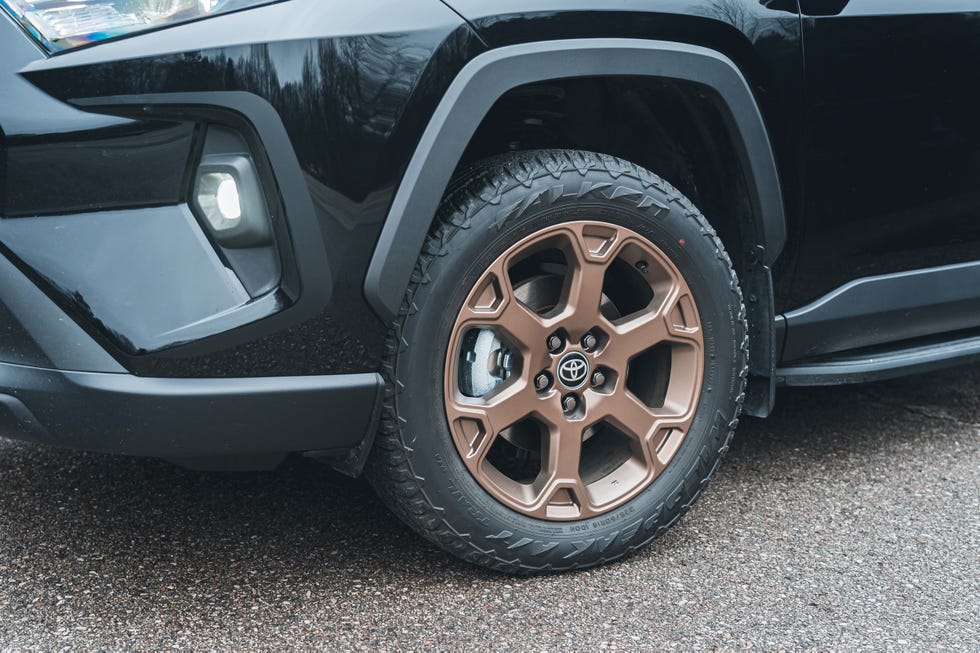Toyota added the TRD Off-Road trim to the RAV4 lineup in 2019, giving this down-to-earth family crossover a chance to get a little closer to said earth with a host of dirt-friendly upgrades. The hybrid didn’t receive the same treatment, but the 2023 RAV4 Hybrid Woodland Edition seeks to span that familial gap, although it comes up short in a few key areas.
Off-Road Kit
Before you start dreaming about tackling Moab on the way to Meijer, it’s worth noting that the Woodland Edition isn’t a pixel-perfect adaptation of the TRD Off-Road. You don’t get the TRD’s extra half-inch of ground clearance, nor do you receive its specific all-wheel-drive system, since all hybrid RAV4s power their rear axles using a single, 54-hp electric motor without any mechanical connection to the engine.
What you do get in the Woodland Edition is a melting pot of form and function. The TRD Off-Road lends its 18-inch bronze alloy wheels wrapped in 225/60R-18 Falken Wildpeak A/T Trail 01A all-terrain tires. The Woodland Edition also borrows the TRD’s springs, dampers, and bump stops. Otherwise, this RAV4 gets a few mild aesthetic tweaks, including a roof rack and mud flaps, as well as a 120-volt outlet in the cargo area.
Fuel-Economy Hit
The RAV4 Woodland Edition, unfortunately, takes a hit to its fuel economy, which poses an existential threat, as that undercuts a major reason to buy a hybrid in the first place. But, if you want your hybrid bedecked in roof racks and higher-rolling-resistance tires, a sacrifice must be made. In our 75-mph highway fuel-economy test, the Woodland’s 32-mpg result was a full 5 mpg below that of the last RAV4 hybrid we tested and 3 mpg below its EPA estimate, which is specific to the Woodland.
All-terrain tires may confer additional grip on loose surfaces, but they are generally not as strong on pavement. On our 300-foot skidpad, the RAV4 Woodland Edition managed 0.78 g, less than the 2019 RAV4 Hybrid Limited’s grippier 0.81 g.
Braking and acceleration tell a slightly happier tale. It took the Woodland Edition just 179 feet to stop from 70 mph, besting the standard hybrid by three feet. Sprints end in a dead heat, with both variants requiring 7.3 seconds to reach 60 mph and 15.6 seconds to pass the quarter-mile mark. No matter the RAV4 hybrid trim you select, the powertrain remains the same, pairing a 2.5-liter inline-four with three electric motors—including the aforementioned one that motivates the rear wheels on its own, and only when additional traction is needed. The system combines for a total of 219 horsepower.
Another high-water mark comes by way of interior noise. You might think that the Falken Wildpeaks would add demonstrable clamor, but nope—at 68 decibels at a 70-mph cruising speed, the Woodland Edition is actually 1 decibel quieter than the RAV4 Hybrid Limited. In more subjective experiences, you’d be hard-pressed to find a difference. The planetary transmission that blends the electric and gas propulsion and mimics a continuously variable automatic transmission does a good job hunting out the efficient segments of the rev range without adding any drone. That’s good because the engine note isn’t pleasant at any speed.
Smooth Rider
Toyota claims that the Woodland’s TRD-specific suspension components are tuned to mitigate bumps and dips of all shapes and sizes, and that rang true in our experience. Southeast Michigan’s roads feel like glorified dirt trails most of the time, and the RAV4 Woodland sailed across them with aplomb, providing competent mitigation without feeling wishy-washy.
If your idea of adventuring includes towing things out in the middle of nowhere, it may behoove you to stick with a gas-powered RAV4. An unchanged powertrain means the Woodland Edition carries the same 1750-pound tow rating as the other hybrids, while the TRD Off-Road and Adventure trims can manage double the mass out back.
On the positive side, no amount of beefcake doodaddery can mess with the outright practicality baked into the RAV4. Visibility is good, and all three mirrors are twice as large as they need to be. The passenger-side dashboard storage tray is a nice touch, and there’s plenty of space to dump tchotchkes under the center armrest and in the tray ahead of the gear lever. Out back, the cargo area can handle 10 carry-on suitcases behind the second row or 22 with the rear seats folded down.
Looking to crank some tunes? Rejoice in the fact that Toyota has sent its crappy old Entune infotainment software to the shadowlands. In its place is the same upgraded setup you’ll find in other new Toyota models, and it’s a vast improvement. Wireless Apple CarPlay and Android Auto are standard on the 8.0-inch touchscreen, and Google-based navigation is available. A 10.5-inch touchscreen is available on higher trims but not on the Woodland.
Missing Features
You know what else isn’t available on this off-road-oriented model? Heated seats. In fact, the options packaging on the RAV4 Woodland Edition is utterly confounding. The SE, which is less expensive than the $34,860 Woodland, can be optioned with packages that add heated front seats, a heated steering wheel, rain-sensing windshield wipers, a power liftgate, and a sunroof, none of which are available on the Woodland Edition, but all of which sure sound nice to have when taking a break from civilization. Maybe it’s always 75 degrees and overcast in whatever forest is closest to Toyota headquarters.
Therein lies the rub. The 2023 Toyota RAV4 Hybrid Woodland Edition is a simulacrum that offers a little pageantry but sacrifices much of the hybrid’s raison d’être. Adding variety to a lineup is good, but the Woodland Edition’s drawbacks make it hard to recommend when every other variant seems more fully baked.
Specifications
Specifications
2023 Toyota RAV4 Hybrid Woodland Edition
Vehicle Type: front-engine, all-wheel-drive, 5-passenger, 4-door wagon
PRICE
Base/As Tested: $34,860/$36,104
Options: running boards, $620; door-sill protector, $199; frameless HomeLink mirror, $175; door-edge guard, $150; fog-light accent trim, $100
ENGINE
DOHC 16-valve Atkinson-cycle 2.5-liter inline-4, 176 hp, 163 lb-ft + 3 AC motors, 118 and 54 hp, 149 lb-ft and 89 lb-ft (combined output, 219 hp); 1.6-kWh lithium-ion battery pack
TRANSMISSION
continuously variable automatic
CHASSIS
Suspension, F/R: struts/multilink
Brakes, F/R: 12.0-in vented disc/11.1-in disc
Tires: Falken Wildpeak A/T Trail 01A
225/60R-18 100H M+S
DIMENSIONS
Wheelbase: 105.9 in
Length: 180.9 in
Width: 73.0 in
Height: 67.0 in
Passenger Volume, F/R: 52/47 ft3
Cargo Volume, Behind F/R: 70/38 ft3
Curb Weight: 3817 lb
C/D TEST RESULTS
60 mph: 7.3 sec
1/4-Mile: 15.6 sec @ 90 mph
100 mph: 20.4 sec
Results above omit 1-ft rollout of 0.3 sec.
Rolling Start, 5–60 mph: 7.4 sec
Top Gear, 30–50 mph: 3.8 sec
Top Gear, 50–70 mph: 5.2 sec
Top Speed (gov ltd): 115 mph
Braking, 70–0 mph: 179 ft
Roadholding, 300-ft Skidpad: 0.78 g
C/D FUEL ECONOMY
Observed: 30 mpg
75-mph Highway Driving: 32 mpg
75-mph Highway Range: 460 mi
EPA FUEL ECONOMY
Combined/City/Highway: 37/38/35 mpg
C/D TESTING EXPLAINED



